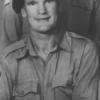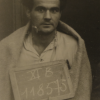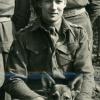David Hardman was born on 22 December 1959 at Hamilton, Scotland, the youngest of a family of four, and spent his early years on the Beechfield small holding in Meikle Earnock Road. Later, he enlisted into the Army on his sixteenth birthday in 1975 and joined the Junior Parachute Company as a boy soldier at Aldershot. Upon completion of his training he was posted to the 2nd Battalion, The Parachute Regiment in 1977.
In 1982 Corporal David Hardman was the Section Commander of 2 Section in 2 Platoon, A Company, 2 PARA and led his section ashore on the 21 May 1982 at San Carlos on East Falkland Island.
David Hardman was killed during the Falklands War. The 22 year-old corporal died at the Battle of Darwin and Goose Green, one of the first engagements in a conflict which ended with British troops re-taking the South Atlantic islands from Argentina.
His father Thomas, a Ravenscraig worker, died aged 39 years when he was electrocuted in an accident at the small holding. Following this tragedy, David moved with his mother Agnes, brother Frank and sisters Ann and Barbara to a flat in Strathaven Road, Hamilton. Agnes, a waitress at the Popinjay Hotel, Rosebank, died in 1977 at the age of 53, and it was Ann who brought up her youngest brother. David attended Low Waters Primary and St John’s Grammar and played football for his school teams and the Boys’ Brigade.
In 1975, immediately after leaving school, David joined Depot, The Parachute Regiment and Airborne Forces as a Junior Soldier. He became a career soldier signing up for three years and later a further nine years. He honed his fitness and, according to Ann, was rarely seen with alcohol and, apparently, never went with girls. She added, however: “After he died, we received a number of telephone calls from girls he knew, so I think he was a bit of a dark horse.” David was promoted to Lance Corporal in 1979 and at the time of death had passed the stringent testing required for entry to the SAS. He served two years in Northern Ireland and narrowly escaped an IRA blast which killed 16 Paras and 2 members of the Queen’s Own Highlanders at Warrenpoint on August 28, 1979. Ann, who still lives in the Strathaven Road flat, said despite that horrific experience her brother remained committed to the Paras.
He was “rarin’ to go” when Prime Minister Margaret Thatcher sent the British Task Force south to remove Argentine forces from the Falklands. “He was home on leave and having a bath when he got the telegram telling him to report back to the Paras base at Aldershot,” added Ann. “I had never heard of the Falklands but David was glad they were going to see some action. He went away next day and that was the last I saw of him.”
David was killed on May 28, one of 15 members of 2 PARA to die in the British assault on Argentine positions at Goose Green and Darwin. Goose Green was considered important to the invasion plan because of its close proximity to the British Forces’ beachhead at San Carlos. It was a fierce battle in which more than 1000 Argentine troops, many of them dug in, faced 600 members of 2 PARA. The fighting spread over two days and David died as part of an ad hoc assault group from A Coy tasked with enemy positions on Darwin Hill overlooking a gorse gully in which members of 2 PARA were pinned down.
John Geddes, who fought with 2 PARA that day and later wrote about the conflict in the book ‘Spearhead Assault: Blood Guts and Glory on the Falklands Frontlines’, said David had been “shot up in an ill-fated assault on Argy positions”. He wrote that ‘Jock’ Hardman was a comrade for whom he would have died, and he added: “One of the other lads had been forced to use (David Hardman’s) body as cover and felt it twitching with enemy fire as Jock defended him even to the death.”
For his bravery in 2 PARA's victory at Goose Green, David was Mentioned in Despatches. He is buried at Wellhall Cemetery, Hamilton, where a service is held each year in memory of him and two other Paras who died on active service and are interred there. Ann, who worked until retirement at the Popinjay, has a daughter, Alyson, and two grandchildren. She still chokes back tears as she remembers her brother and remains bitter that he died in a war that she believes could have been avoided. “Margaret Thatcher went into it too quickly without thinking of the consequences,” she said. “There could have been a diplomatic solution.” Ann added: “I couldn’t be more proud of David, but I wish he had not given his life for his country. “That, though, is me being selfish. I couldn’t have held him back. He would have knocked me down to get out of the door to go. He would definitely put his life on the line for the Paras; they were like his second family. And if he had not died in the Falklands, it could have been somewhere else. It’s what he wanted to do. I am more than proud of him, but I miss him so much and I am just waiting until I get to see him again.”
Compiled by Jimmy O' Connell with assistance from Bob Hilton
Read More




Latest Comments
There are currently no comments for this content.
Add Comment
In order to add comments you must be registered with ParaData.
If you are currently a ParaData member please login.
If you are not currently a ParaData member but wish to get involved please register.